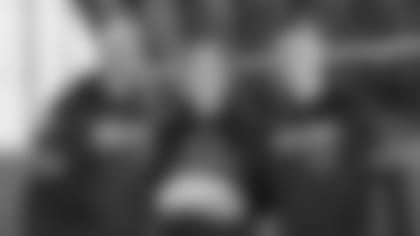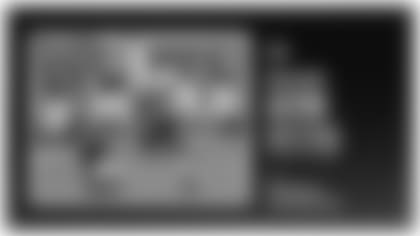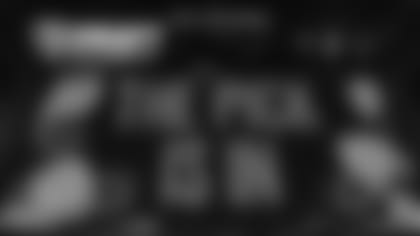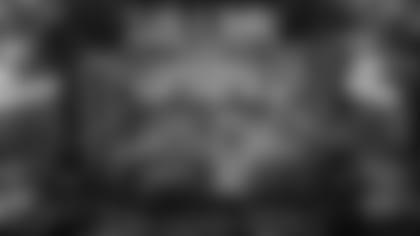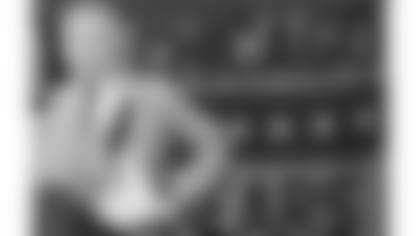Jim Riebandt reflects on 37 years with the Bears
PA Announcer Jim Riebandt, who will retire at the end of the season, reminiscences about his experiences calling Bears games.
By: Nathan Smith | Dec 09, 2019
On any winter day at Soldier Field, the Chicago Bears might worry about snow, the bitter cold or a hard wind coming off Lake Michigan.
On the last day of 1988, none of those things were issues. It was unseasonably warm for Chicago, with the temperature hovering between the high 20s and low 30s. It might have been the ideal day for the Bears to take on the Philadelphia Eagles in the divisional round of the playoffs were it not for the gray haze that oozed onto the field during the two-minute warning at the end of the first half.
Bears PA Announcer Jim Riebandt saw the smog coming in from his right. It was so thick that he thought for a moment that he was seeing smoke from an enormous fire nearby: an alarming thought, given Chicago's history.
It turned out to be a benign but stubborn fog, so thick that hardly anyone--not the TV audience or Riebandt himself--could see the action on the field. The game would become one of the most famous events in Chicago Bears' history: the Fog Bowl.
For Riebandt, it was a proving ground. The team's PR director connected Riebandt with an usher holding a walkie-talkie. A member of the stats crew could get close to the field to make out the figures of running backs Neil Anderson and Thomas Sanders, pressed into extra service because Mike Ditka couldn't trust his quarterbacks to distinguish the white-jerseyed Eagles defenders from open space.
For hours, that was the assembly line of information. The stats crew member told the usher. The usher told Riebandt. Riebandt told the stadium.
To thousands of fans who had traveled to Soldier Field, they might as well have been listening to a radio broadcast. The higher the seats, the more they needed the voice of Jim Riebandt. He started adding more details than down and distance, transitioning to something closer to play-by-play than his normal announcements.
"Blocking, tackling, pass intended for, much more description," says Riebandt.
Terry Bradshaw and Vern Lundquist, calling the game for CBS, spent an entire half running out of ways to explain to their audience that they really couldn't see anything. Halfway through the fourth quarter, sideline reporter Will McDonough revealed Riebandt's secret system on the air.
"That's what we need," said Lundquist. "I wondered how he was doing such a good job."
On the very next play, Riebandt called a Randall Cunningham pass incomplete, then had to correct himself, taking Lundquist along for the ride.
"Maybe he's not doing such a good job," Lundquist said with a chuckle. "I was reacting to him."
The Fog Bowl was a moment of glory for an often-thankless job. Riebandt soaked in every second of it.
"Being a little bit of a publicity hound after the game," says Riebandt, "I stood by the Bears locker room and got interviewed by every person in the media. It ran in the AP over the whole world. I was getting letters from my friends in college: 'Are you the same Riebandt we went to school with?'"
This month, when the Bears take the field against the Kansas City Chiefs, Riebandt will call his last game. Riebandt has spent 37 years as a disembodied voice to Chicagoans, faithfully advising them of down and distance through thick and thin, even in the oddest of circumstances.
It will be a bittersweet moment for the longtime announcer.
"My mom always said all good things must come to an end," says Riebandt, "which I understand. Fresh blood, new blood new approach, it's a good thing."
Landing the job
Since the mid-1970s, Riebandt has moonlighted at stadiums while practicing contract law in the northern suburbs. He credits his father's connections for pushing clients his way. In fact, his father's best friend, eventual DePaul President Father John Richardson, helped make Riebandt the PA Announcer for the school's basketball team in 1977. It was a great time to be associated with Blue Demon basketball.
Riding off the wave of confidence emanating from DePaul's 1978 run to the Final Four, Riebandt sent a letter to the Chicago Bears, asking if they were looking for a new announcer. Like so many born and raised in the greater Chicago area, he had lived and died with the fate of the team ever since he saw his first Bears game at Wrigley Field with his father in 1958.
At the time, Chet Coppock was handling PA duties for the team, but management decided that they could use Riebandt as a backup. So Riebandt studied at the unofficial Chet Coppock School of Timing and Rhythm, learning the ropes to engaging a stadium 10 times larger than DePaul's Alumni Hall.
From Coppock, Riebandt learned that a PA Announcer had to be a fan, had to adore the names and numbers he'd say week after week, year after year.
"He was a professional, consummate," says Riebandt of Coppock, who passed away at the age of 70 earlier this year. "He was a big Bear fan. At times, he'd let his emotions go a little bit, but that's where I got my little bravado."
After Coppock left the Bears, Riebandt got the job in 1982, and he started learning the sorts of things that only experience can teach. The sound system ran on a three-second delay, meaning Riebandt would have to cup his ears to avoid being distracted by the echoes of his own voice.
He also needed to be aware of the stakes off the field. Riebandt entered the job at a time of labor upheaval. He called one game, against the New Orleans Saints, before a strike swallowed half of the season.
"It was a beautiful day in the middle of September," said Riebandt. "After the warm-ups and the anthem, the players walked to the middle of the field to do a solidarity handshake. Coach [Mike] Ditka was out of his mind on the sidelines. The game was as dull as it could be. It was 10-0, New Orleans won, and then there was a strike."
A graduate of Notre Dame, Riebandt's weekends in the fall have often included driving out to South Bend, where he's a season-ticket holder, on Saturday, then getting back to Chicago in time to call a Bears' home game. He always aspired to bring the raucous stadium experience that he knew as a college student to Soldier Field.
"The traditions of Notre Dame parallel the traditions of the Bears," said Riebandt, mentioning the large stadiums and winning traditions dating back before the Great Depression.
When his worlds merge and the Bears sign a player from Notre Dame, would Riebandt show favoritism to his fellow alums?
"Absolutely," says Riebandt, "Just ask Tom Thayer. I used to introduce him 'Tom from NOTRE DAME.'"
By his fourth season, calling the game started to feel natural to Riebandt. It helped that Soldier Field had installed a new speaker system that eliminated feedback. It helped even more that the 1985 Bears were so dominant that his voice could be associated with the most memorable team of the modern era.
Years later, certain games stand out more than others. Obviously, there was every moment of the '85 season. Riebandt also puts the Fog Bowl and last season's 15-6 win over the Super Bowl-bound Los Angeles Rams in his personal pantheon.
In 2002, the Bears played the entire season at Memorial Stadium in Champaign as Soldier Field underwent a massive renovation. While the season was forgettable, a 4-12 effort, Riebandt returned to Chicago with a career-defining schtick.
Coppock taught him to space out the announcement of a timeout to give the band an extra moment to start playing. When done correctly, there would be no time gap between the sentence "There's a timeout on the field" and the music.
Coppock accomplished this by breaking the sentence into two parts.
"There's a timeout. On the field."
In Champaign, sarcastic fans started shouting "where" during the pause and "oh" after the answer. Riebandt started playing into the gag. Even though the band has long been replaced by recorded stadium music, the joke will be old enough to vote in the next presidential election.
Riebandt is happy to break down the bit like a coach in the postgame presser.
"There's a timeout!" he says, drawing out the last word.
He then takes on the whispered voice of the crowd,
"Where?"
Then his baritone returns.
"ON the field," he says before adding, "It's the pregnant pause that's the most important."
A voice heard by millions
Riebandt can look back and marvel at the commitment he's given the Bears and the resulting rewards. He's missed three games, all in the preseason. One was for a wedding; the other two were for open-heart surgery.
"I've done almost 380 games," says Riebandt, "multiply that by 60K you're into almost the millions of people I've talked to. It's almost overwhelming in a way."
Given that the result of that equation is nearly 23 million, it seems likely that over a million people have been guided through a game by Riebandt's voice, even accounting for longtime season ticket holders.
The job may seem simple, but there's always something that could go wrong. Riebandt has to stay vigilant to avoid embarrassing himself over a hot mic. Mixing up players and numbers is an occupational hazard, and Riebandt can still cringe over the time he accidentally misidentified Walter Payton as Chuck Foreman, the Minnesota Vikings tailback who wore the number 44.
"That was when we had the windows open," says Riebandt. "The patron below me yelled, 'What are you looking at?'"
His spotter, Bill Wilkey, communicates the player to him through an earpiece. He keeps track of down and distance in the booth. He memorizes the look of players from a distance: the way they move, the shape of their bodies. Numbers are useful, but they're fallible.
There is more to the job than accuracy. Riebandt didn't want to be like a robot, reciting plays but offering little else. He gave great thought to what he could add to the Bears experience.
"Being a Bears fan," says Riebandt, "I always would have liked to present what I would have wanted to hear at the game. That was sort of my standard. And I've tweaked it. I've listened to people, 'Hey Jim, we'd like to know this or that.' You can cut the crowd off if they're booing the team. It does happen sometimes. You can excite the crowd a little bit. You can inflect intonation, a little edge."
Riebandt didn't want to hide behind a false sense of impartiality, but he knew that he needed to hold himself to a certain level of professionalism. To visiting and impartial fans, he represented the organization. He was always careful not to disrespect the other team.
"I'm for the Bears," says Riebandt, "but I don't cross the line. There's a real fine line and the crowd buys into it. It's fun. When the crowd responds, it is a big rush."
End of an era
If it will be odd for longtime Bears fans to hear a different voice over the PA system next season, it will be more so for Jim Riebandt.
He won't miss Soldier Field because he still plans on being there.
"Three or four of my best friends have season tickets," says Riebandt. "They're fighting over, 'I wanna sit with you.' 'You can sit with me.' I'm not sure I'll go to the really cold games to tell you the truth but of course, I'll go especially to the first couple of games next year."
He knows it won't quite be the same. There are a few things that he'll miss more than others.
"Probably walking through and seeing all the people," says Riebandt, "and saying hi and walking through the tunnel where you walk. 'Hi Jim, Hi Jim.' Getting the elevator up, getting the key to the booth and walking in and saying 'it's gameday.'"
For 37 years, he's been a part of the Bears, not a fan and more than an employee. He's been a small part of the project that George Halas began a century ago, keeping Chicago a football town.
"It's the camaraderie," said Riebandt. "It's sort of the journey to get there. The game is the game, and they kind of blend together except for the playoff games. The association and the friendships. That's what I'll miss."
All good things come to an end.


